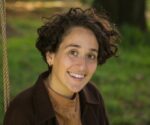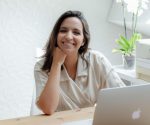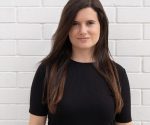She doesn’t buy soap, shampoo, creams, toothpaste, or detergents. She does everything at home, without waste, chemicals, and with simple ingredients. We spoke with Ângela Plácido, from the Atreve-te a ser feliz page (Dare to be Happy) about sustainability, but also family, food, and the desire to live in the countryside.
Ângela Plácido, 42, makes it seem like the days have more than 24 hours. In one day, she fits a full-time job, workshops, shampoo and detergent production, three children, and a balanced diet with practically no packaging.
Those who visit her page now, with more than 13,000 followers, can’t imagine that not so long ago it was closed only to her friends, the first to try her creations. She started producing soaps because her husband had a skin problem and never stopped. Shampoos, creams, and also detergents followed.
She does all this based on simple ingredients and has now started to pass on the message in workshops.
Sustainability is part of her day to day life, whether in her food – almost plastic-free and full of locally bought and organically sourced vegetables – or in her desire to live in the countryside. That’s where she feels happy.
But before she sets off on this adventure, Peggada has caught her for a chat. Get to know better the author of the page that sparks us: Atreve-te a Ser Feliz (Dare to Be Happy).
Where did your concern for sustainability come from?
My family has always had a very strong connection with nature. My parents are from a rural background, and although we live in the city, we have always maintained this connection to the countryside. We camped for years, we really had a fixed trailer.
Of course, the awakening to sustainability came later, perhaps with the birth of my first son, Francisco.
In your case, having children was even an incentive to a more sustainable life.
Yes, what I was already advocating made more sense. I was also lucky enough to find a person who was aligned with what I already believed in. To give you an idea, our honeymoon was camping [risos], from Seville to Gerês.
We adopted some more sustainable habits as we moved in together, but when a child comes along you start thinking “what impact do you want to have?” That’s when you start thinking about the world you want to leave to your children.
I remember 13 years ago, when Francisco was born, I wanted to use reusable diapers, but there wasn’t much information yet. It was not that time. But it was at that time that João, my husband, had a skin problem, which led me to look for new solutions. I did some training and started making some more natural soaps. Then we stopped doing so much shopping in hypermarkets and started buying more locally. It makes perfect sense to me this closeness, this knowing where the vegetables you are eating come from.
This care and these new practices have built up over the years and with my other two children, yes, I was able to use the reusable diapers I wanted so badly. From then on I didn’t stop. It didn’t make sense to me to use these diapers and wash them with chemicals, so I started making my own detergents.
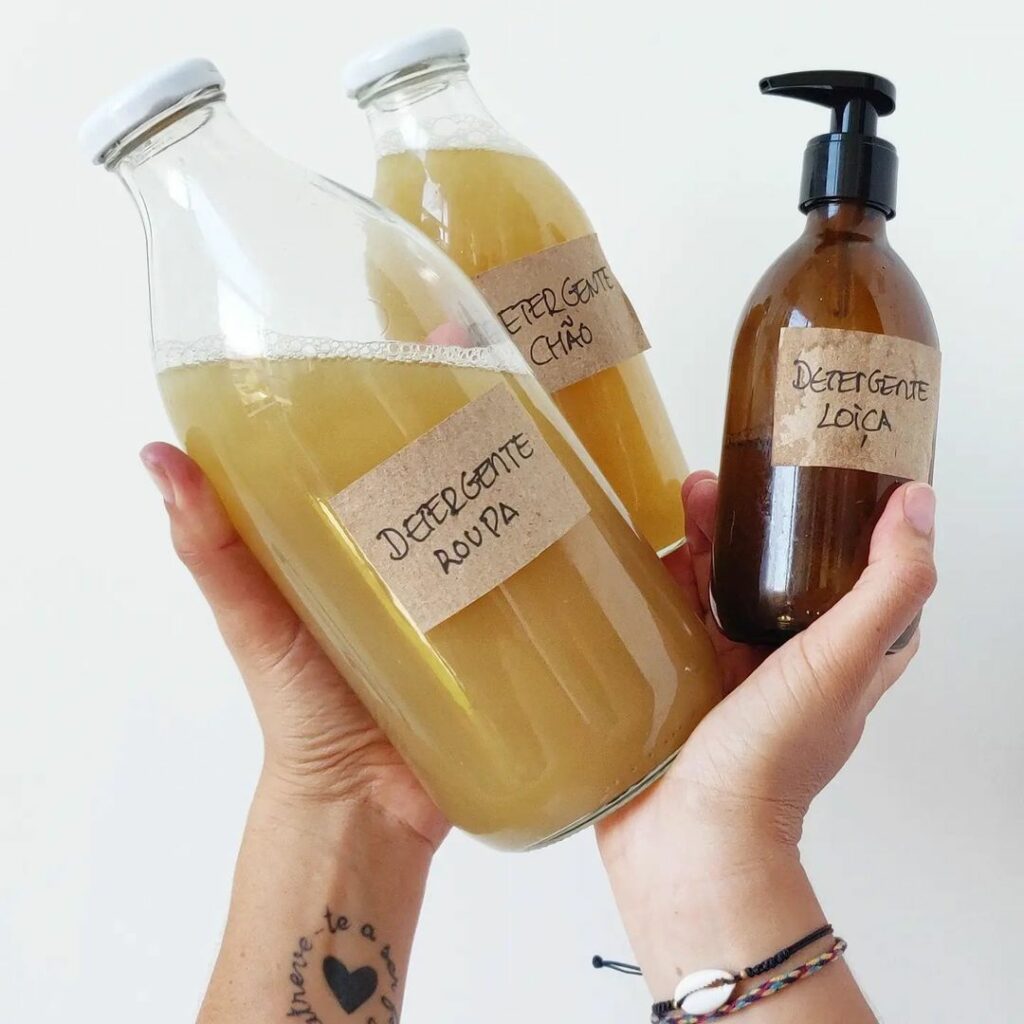
What was the first detergent you made?
It was the clothing one, liquid. But before that I made the olive oil soaps for my husband and soon after the creams.
Have you been trained in the area?
It was very much trial and error. I did a soap workshop at the very beginning, but from then on it was a lot of research, a lot of books, studying the formulas. I try everything first before giving it to others.
How does your production work?
I’m taking it slow. I started making the shampoos, detergents, and they were my Christmas gifts. People started to like it, and in the lockdown, more requests came in.
For you the pandemic was a boost to your work.
Completely. Until then, my Instagram was not even public.
Was there a post that made the change?
There are always a few that go boom. For example, when I shared the functionalities of baking soda or cleaning the mattress. That’s usually when the posts make a difference and you can’t find that information on other pages.
Would you like to dedicate yourself 100% to this area?
I wish I had more certainty. With children it is even more complicated to move forward, because you always want to give the best to your own. There is a lot of competition and if you don’t have the right brand, the right concept, you won’t make it. People ask me why I haven’t created my own brand yet, but people don’t know the bureaucracy that is involved in that process.
What kind of ingredients do you use to make your products?
If we talk about detergents, we have bicarbonate and carbonate, easy to find in drugstores or grocery stores in bulk. Then you have the citric acid, the soap, and the cleaning vinegar. With these five ingredients you do it all, you don’t need anything else. You can buy a kilo of baking soda for 1,30€ and do you know how long it lasts? Immense. It’s good for laundry, for the floor, for cleaning mold off the friezes.
When people hear the value, it does arouse curiosity. It’s just that the difference is brutal in the budget.
For cosmetics, the basis are essential oils and vegetable butters, which are also easily found on the market and can be used for various products. The funny thing is that one ingredient makes several products. For example: with shea butter you can make something for your hair, for your body, and even a lipstick for your scalp. It is a matter of exploring the matter.
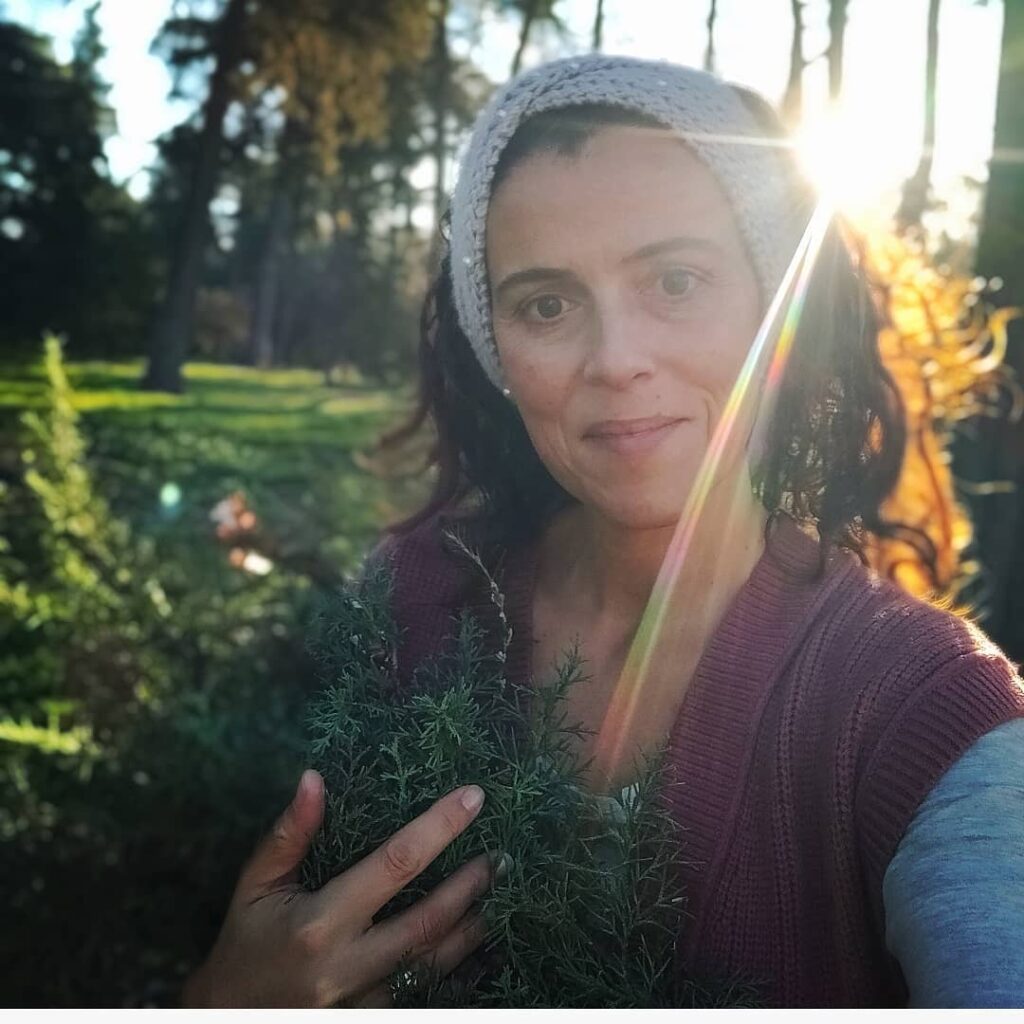
What are the sustainable practices in your daily life that you don’t give up?
I recycle and am happy with what little I have to recycle now. I used to take the packaging off at the supermarket so that I wouldn’t bring it home, because it was so confusing, but now I really try not to buy any packaging.
I don’t have shampoo, deodorant, toothpaste or packaged creams, because I make them. What do I buy? The oils and a perfume for my oldest son.
You have also started targeting your page with food-related content. Why?
I was a vegetarian for a long time, when there was not much talk about it yet. Then I married a carnivore and developed anemia in pregnancy, and since there was not as much information as there is today, I went back to eating meat. Nowadays I am not a vegetarian, but I eat very little meat, I do eat some fish, because I like it very much. And even my husband often opts for vegetarian at school.
In terms of sustainability in food, the problem was that we left behind the habits of our grandparents. Meat and fish was for feast days.
How do you usually do your shopping for the kitchen?
I buy very local, seasonal, and bulk. I always try to know what is in season and avoid anything that comes from greenhouses.
I plan my meals so that there are only two meals with meat and fish per week. Often our dinner is soup, but a soup with noodles or grains, plus fruit and sometimes a loaf of bread.
The fish is always from the sea, and the meat is organic. I make sure of that. Since we are going to consume, let the best be consumed.
Does this connection to the land, to nature, to what is authentic, make you want to leave Lisbon?
I want it very much. I have always lived in Lisbon, first in Beato, then Santo António dos Cavaleiros and now in Penha de França. But all my life, while living with my parents, we pretty much only slept at home. During the day it was school and on the weekend we always went camping, summer or winter.
I bought a house ten years ago in the country. We have started construction and the idea is to live there. It already has a pretty nice orchard and the idea is to produce our own food. I hope that will happen later this year. Being away from this mess is worth gold. That is where I feel truly happy.
What footprint do you want to leave on this planet?
There is something that defines me: simplicity. This way of being, this experience has led me to very good things, it has simplified my life. I have a life with less material possessions and more experiences.
I am not a minimalist, but I have little and with that little I am happy. I realized that living with little makes me happier.
Esta publicação também está disponível em:
![]() Português (Portuguese (Portugal))
Português (Portuguese (Portugal))




